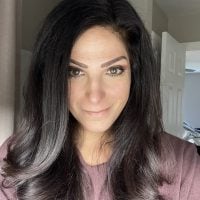
I slid the cassette tape into the cassette player pushing the door closed.
Taking a deep breath, I pressed record. “Oh, come on,” I said as the wheels to the cassette tape spun behind the door capturing my thick accent.
The purpose behind this little recording session was to lose my accent and sound as “refined” as possible, whatever that meant to my 13-year-old self.
Every time I played back the recording, the sound of my voice was like a punch to my stomach. I grew to hate the sound of my voice a little more. I remembered one of the last days of middle school, sitting on the concrete steps of my small Catholic school.
“You sound so ghetto when you talk,” Anthony said standing on the stair above me in his starched, spotless white shirt and navy blue dress pants. Even though Anthony also came from an Italian family like me, there was a clear distinction. His dad was heavily involved in local politics. He loved the sound of his own voice, and you can bet there was no hint of an accent.
My parents made the move out of one of the Little Italys in Central Massachusetts to a suburb closer to Western Massachusetts, which also meant I would not be continuing on to the local Catholic high school with my other eighth grade classmates.
On my first day of being the “new girl” in a small town, I received a quick education in what other people thought about where I used to live. It’s the first time I ever heard anyone speak poorly about where I was from.
“I don’t know how things worked in Thornburg, but around here we run a pretty tight ship,” my new Guidance Counselor said looking down at me through his glasses. I felt small. A knot formed in my stomach.
“Where are you from?” The question was coming from one of my new classmates who looked as if she could be on the cover of Teen Vogue. She had the brightest blue eyes and most perfectly highlighted blonde hair I had ever seen.
“Thornburg,” I said with a smile. I was secretly happy that someone had voluntarily spoken to me.
“Oh!” She said placing a hand over her heart leaning back dramatically, “Isn’t it like really ghetto there?” she asked her eyes widening. I shrugged. “But like why are you so dark? Where’s your family from? Like your hair is almost black,” she said lifting a lock of my raven hair off my shoulder.
“My Nonno and Nonna are from Italy. They…” I started to say, but she quickly cut me off.
“Your what? What’s that?” She asked loudly with a sharp laugh, which caught one of her friend’s attention who was seated at the desk to her right.
“My grandfather and grandmother,” I explained.
“Oh,” The blonde beauty queen said seeming satisfied but also disinterested as she turned to have a side conversation with her friend. I felt my face get hot as I flushed thinking I had overshared something personal even though it was just the names I used for my grandparents.
Tape recording myself was going to have to be the very least of the changes I would need to make to fit in here. “Imagine if she knew my Nonna never got her driver’s license?” I thought to myself. I’d be the laughing stock of ninth grade.
I started to become more cautious about sharing where I was from with other people when they asked. Over the next few months, I made small edits to myself. My work with my cassette player was really paying off and my accent was nearly undetectable. When other people asked where I was from, I gave a general location instead of the exact city so not to be categorized as “ghetto.”
The changes were so gradual and so small I didn’t notice them on a conscious level. It was more like second-guessing myself before giving out too much information, like any of us would do in a more formal setting, like a job interview.
I had started to slowly cut away pieces of my old self, from my old neighborhood, which didn’t seem to fit my new life. In doing this, I made friends who I didn’t really have much in common with, but since I had molded myself after them were none the wiser. I didn’t outright feel like a fraud, but I certainly didn’t feel like myself.
I still saw my Nonna and Nonno every weekend, but I didn’t talk about it with friends. Our family was tight-knit, and in order to miss a Sunday dinner, you would quite literally need to be missing a limb. I lived a double life until both my Nonna and Nonno passed away between my junior and senior year of high school.
I didn’t feel relief now that the final thread tying me to my old life had been severed. I felt lost. Heartbroken.
Without my Nonna the family fell apart quickly. She was truly the glue that held everyone together. Arguments and silence took the place of daily phone calls and weekly dinners that my family had enjoyed until now.
A few weeks after my Nonno passed away, my family found out that a local bus company wanted to buy the property and level it to build a parking lot and garage for their buses. The bus company worked quickly. They sent their lawyers to my uncles’ houses still on the heels of their grief. A number was put on my family worth to settle any disputes over money between the siblings.
I nearly drove past where their light blue cape style house once stood. The two acres behind the house (unheard of in the city these days), which my Nonno meticulously maintained and grew every crop imaginable from pumpkins to tomatoes to grapes, was a freshly paved parking lot with bright yellow lines. Buses were parked from the street to where the tomato plants and bocce court used to be.
It looked as if the house had never been there. My family had never been there. It was as if we never existed.
I ducked under the “no trespassing” rope, and as I walked past bus after bus, I could see the playground still stood in the woods. There must have been too many rocks and trees in the way to pave it. I sat in the swing. I pushed my feet out to start swinging, hearing the familiar squeaking of vibration of the chain against the metal.
I remembered a story my Nonna told me about my Nonno. When they were newly married he took a job at a local paper mill. One day around lunchtime, he came home from work, which was unusual for him as he worked long hours.
“Angelo! Are you okay?” She asked as he stood in the doorway to the house.
“I got sent home,” he explained. He went on to tell my Nonna that a coworker was making fun of him for going back to school to get his GED.
His coworker kept making comments, “You think you’re better than me?” “You’re just a guinea like I am. No one is going to hire you no matter what degree you have.”
My Nonno had enough and punched him square in the face.
Not that I condone hitting someone, but I was proud of him for standing up for himself, not letting other people’s opinions stop him from bettering himself. My Nonno wasn’t ashamed of where he came from; he didn’t let it define what opportunities the future held for him or the rest of my family.
I smiled continuing to swing on the swing…for a minute, I could almost feel him standing behind me, pushing me. Maybe he was? Pushing me. To move forward, but not forget the past.
Tears welled up in my eyes as I tried to imagine what my family must have gone through to come to the United States. Here I was selfishly worried about what teenagers my age who had never been outside the confines of their small town thought of me. How foolish was I being?
I looked back through the parking lot to where the house once stood and a chill washed over me. If my aunts, uncles, cousins, and I didn’t carry on our traditions that we grew up with and loved so much as kids, our heritage really could be leveled as easily as their old house. If the part of our story of where we came from wasn’t remembered, talked about, and celebrated, we ran the risk of forgetting where we came from, and at what cost? To fit in?
I leaned back into the swing looking up at the sky and smiled. I had my whole life ahead of me still, and I’d be damned if someone was going to make me feel as if I didn’t deserve a chance at every opportunity that presented itself. At the core of my family story, there is one thing that stood out. Hard work. And if being from a family of immigrants and a rough neighborhood is where I learned my work ethic from, then I was proud.
I learned that plotting a course for the New World is best done by both looking back on the history of where you came from and keeping an eye on the horizon ahead of you. It’s best to remember why you embarked on your journey to begin with, while looking forward to every new opportunity.
We can embrace our family history and use it to empower ourselves along our journey.
~
Please consider Boosting our authors’ articles in their first week to help them win Elephant’s Ecosystem so they can get paid and write more.


 Share on bsky
Share on bsky




Read 4 comments and reply